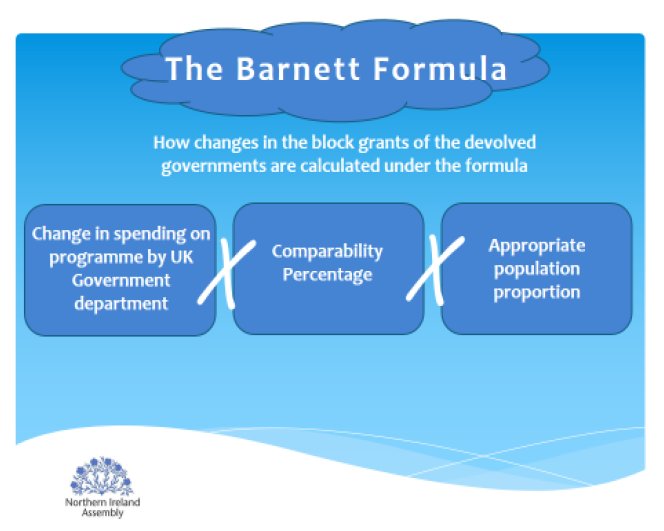Report on the Review of the Operation of the Barnett Formula
Session: 2014/2015
Date: 17 June 2015
Reference: NIA 254/11-16
Mandate Number: Mandate 2011/16 14th Report
barnett-formula-review-report.pdf (1.88 mb)
Introduction
Background and Purpose
1. In February 2012 the Committee for Finance and Personnel (CFP) received preliminary evidence from a panel of expert witnesses which indicated that, while historically the Barnett formula has provided generous funding to Northern Ireland, due to various factors, it is ‘no longer a safe haven’ and the point has been reached when it appears Northern Ireland ‘will not do particularly well out of the Barnett formula in future’ in terms of relative need. Members subsequently noted the commitment made by the Conservative, Labour and Liberal Democrat Party Leaders in advance of the Scottish Independence Referendum that there would be a continuation of the Barnett allocation for resources (a commitment which appears to have been reaffirmed in the Conservative and Labour party manifestos for the General Election 2015).
2. It was in this context that, on 24 September 2014, the Committee agreed the terms of reference for a review into the scope for improving the operation and administration of the Barnett formula, with a view to ensuring that the future needs of Northern Ireland are adequately met.
3. This review has several key objectives including:
- examining how the formula has operated in allocating resources to Northern Ireland, including the extent to which public spending per head in Northern Ireland has converged with the average level of public spending per head in the UK;
- considering the factors which could influence this convergence now and in the future;
- exploring whether the formula should be supplemented with an additional mechanism to take account of relative need and economic circumstances in Northern Ireland;
- examining concerns relating to the administration of the formula; and
- specifying the issues which, if addressed, would support devolution in Northern Ireland by improving the future operation and administration of the formula.
4. To inform the Committee’s deliberations, written and/or oral evidence was received from the following expert witnesses and stakeholder representatives between November 2014 and April 2015:
- Professor Derek Birrell – Professor of Social Administration and Social Policy, Ulster University;
- Alan Bermingham – Policy and Technical Manager, Chartered Institute of Public Finance and Accountancy (CIPFA);
- Professor Paul Cairney – Professor of Politics and Public Policy, Department of History and Politics, University of Sterling;
- Dr Graham Gudgin – Centre For Business Research, Judge Business School, University of Cambridge; Chairperson of the Ulster University Economic Policy Centre Advisory Board;
- Professor David Heald – Professor of Accountancy, University of Aberdeen Business School, University of Aberdeen;
- Professor Gerald Holtham – Academic, Cardiff Business School, University of Cardiff; Chairperson of the Independent Commission on Funding & Finance for Wales (also known as ‘the Holtham Commission’);
- Professor Iain McLean – Professor of Politics, School of Politics, Oxford University;
- Professor Colin Thain – Professor of Political Science, University of Birmingham; and
- Professor Alan Trench – Hon. Fellow of Edinburgh University & UCL Constitution Unit, London.
5. In addition, the Committee commissioned research, which included a review of relevant literature and several members of the Committee visited Edinburgh in May 2015 to discuss issues of mutual interest with senior officials from the Scottish Government and with members of the Scottish Parliament’s Finance Committee.
6. This summary review paper, which outlines the key issues arising from the expert evidence and signposts the reader to the source documents, is intended to inform a plenary debate by the Northern Ireland Assembly in June 2015. It is also anticipated that the evidence gathered, the review paper and the subsequent Assembly debate will inform the Department of Finance and Personnel (DFP) and the wider Executive in terms of any future developments in relation to the devolution funding arrangements for Northern Ireland and will also contribute to the wider UK debate in this regard.
How does the Barnett formula work?
7. In short, the Barnett formula is the mechanism used by the UK Government to allocate more than half of total public expenditure in Northern Ireland, Scotland and Wales. The formula has been used for the last thirty years to determine the annual increase (or decrease) in allocation. Each year, in the case of increases, the increments are added on to the previous year’s allocation (the baseline) to create what is now a significant block grant of funds. The baseline budgets of the devolved regions are historic, having rolled forward over the years, with the formula applying only in relation to changes and not the overall baseline expenditure.
8. The Barnett formula works on the basis of the calculation in Figure 1 and essentially provides the devolved governments with a population-based share of the change in planned spending by UK Government departments on comparable services in England, England and Wales or Great Britain (depending on the coverage of the expenditure considered). The comparability percentage relates to the extent to which services delivered by UK Government departments correspond to services delivered by the devolved governments. The product of the formula is known as the ‘Barnett consequential’ and determines the change to the block grant.
Figure 1

9. The Committee was reminded that, outside of the Barnett formula allocations, around 40% of Total Managed Expenditure is Annually Managed Expenditure (AME), which is agreed annually with the Treasury as it consists of demand-led programmes, mainly social security, including tax credits. In addition, there have been separate funding allocations, agreed as ‘special packages’, outside the Barnett formula, which are discussed at paragraphs 23 and 27.
10. More detailed information on how the formula works is available here and here. More generally, the funding arrangements for the devolved governments, including the Barnett formula, are set out in HM Treasury’s Statement of Funding Policy.



